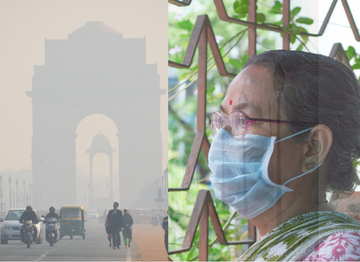Delhi’s Air Quality Crisis: Protecting the Elderly’s Respiratory Health
Nov 11, 2025

Delhi, often described as the heartbeat of India, struggles with an alarming air pollution crisis. The city’s air quality frequently plummets to hazardous levels, posing a serious health risk, particularly for vulnerable groups like the elderly. This blog explores the causes of Delhi’s deteriorating air quality, its impact on senior citizens, and effective strategies to protect their respiratory health.
Understanding Delhi’s Air Quality Crisis
Causes of Pollution
Delhi’s air pollution stems from several factors, including:
- Vehicular Emissions: Heavy traffic contributes significantly to harmful pollutants like nitrogen oxides and carbon monoxide.
- Construction Activities: Dust from ongoing construction projects releases fine particulate matter (PM2.5 and PM10).
- Crop Burning: Farmers in neighboring states burn crop stubble, significantly raising pollution levels during winter.
- Industrial Emissions: Factories around Delhi release toxic gases that worsen air quality.
- Weather Conditions: During winter, temperature inversion traps pollutants close to the ground, increasing their impact.
The Role of AQI
The Air Quality Index (AQI) measures pollution levels on a scale from 0 to 500. In Delhi, the AQI often crosses 300, indicating severe pollution. Key pollutants include:
- PM2.5: Particles smaller than 2.5 microns that can penetrate deep into the lungs.
-
PM10: Larger particles that can cause irritation and respiratory discomfort.

Impact of Air Pollution on the Elderly
1. Respiratory Issues
Elderly individuals are more prone to:
- Chronic Obstructive Pulmonary Disease (COPD): Pollution exacerbates symptoms like coughing and breathlessness.
- Asthma Attacks: Seniors with asthma experience increased flare-ups in polluted environments.
2. Cardiovascular Risks
Fine particles like PM2.5 can enter the bloodstream, increasing the risk of heart attacks and strokes.
3. Reduced Immunity
Weakened immune systems in older adults make them more susceptible to infections and respiratory illnesses.
4. Psychological Effects
Long-term exposure to pollution has been linked to cognitive decline and stress, affecting seniors' mental well-being.
How to Protect the Elderly’s Respiratory Health
1. Improve Indoor Air Quality
- Use Air Purifiers: Invest in HEPA air purifiers to filter out harmful particles.
- Seal Windows and Doors: Prevent outdoor air from entering the house.
-
Maintain Cleanliness: Regularly clean surfaces to reduce indoor dust and allergens.

2. Equip with Respiratory Aids
- Provide seniors with N95 or N99 masks to wear outdoors.
- Keep steam inhalers handy to soothe respiratory passages.
3. Promote a Healthy Diet
- Antioxidants: Include foods like spinach, citrus fruits, and berries to fight oxidative stress.
- Hydration: Encourage drinking plenty of water to keep airways moist.
- Herbal Teas: Ingredients like ginger and turmeric reduce inflammation.
4. Limit Outdoor Exposure
- Avoid outdoor activities during peak pollution hours (early morning and evening).
- Plan essential outings when AQI levels are relatively better.
5. Encourage Regular Health Checkups
- Regular visits to the doctor can help monitor respiratory health.
- Ensure seniors receive vaccinations for flu and pneumonia to lower the risk of infections.
Community and Policy Measures

Government Initiatives
- Implementation of Graded Response Action Plans (GRAP) to curb emissions during high-pollution periods.
- Promotion of electric vehicles to reduce vehicular pollution.
- Stricter enforcement of construction dust control measures.
Community Actions
- Participate in tree plantation drives to increase urban greenery.
- Advocate for better waste management and recycling practices.
- Support initiatives to raise awareness about pollution and its health impacts.
Long-Term Solutions for Cleaner Air

1. Adoption of Green Energy
Transitioning to renewable energy sources like solar and wind can significantly cut emissions.
2. Enhanced Public Transportation
Investing in cleaner, efficient public transport systems can reduce dependence on private vehicles.
3. Urban Planning
Building green belts and increasing vegetation in urban areas can help absorb pollutants.
Encourage citizens to carpool, reduce waste burning, and support eco-friendly practices.
Delhi’s air pollution crisis presents a pressing health challenge, particularly for the elderly. While systemic changes are essential for long-term solutions, individual efforts can make a difference. By taking proactive steps to protect seniors’ respiratory health and advocating for cleaner air, we can help them lead healthier and more comfortable lives. Caring for our elders isn’t just a responsibility—it’s a way to honor their golden years.


